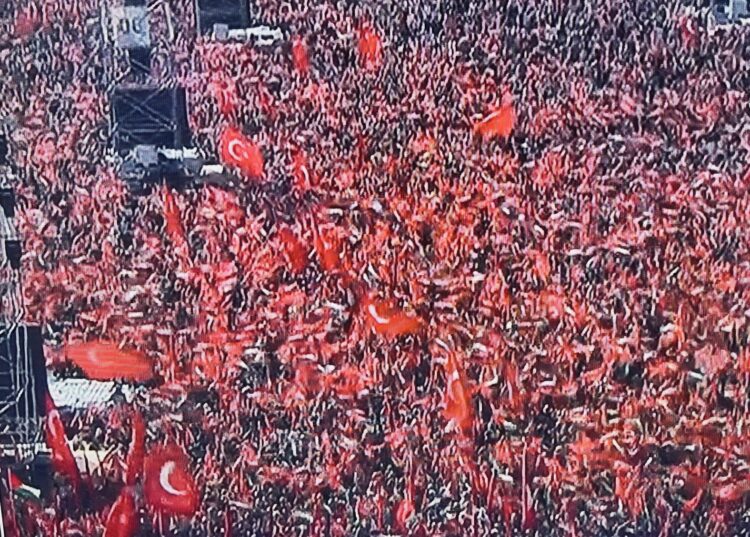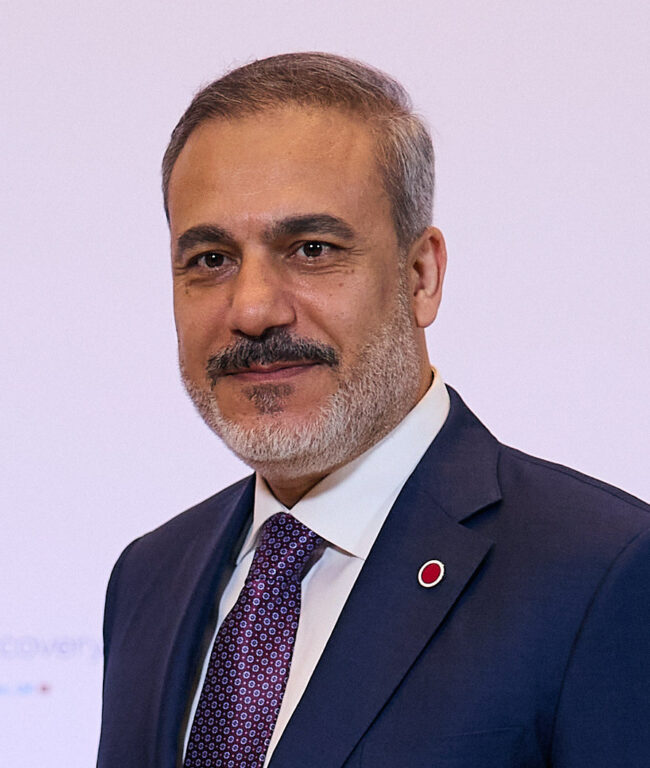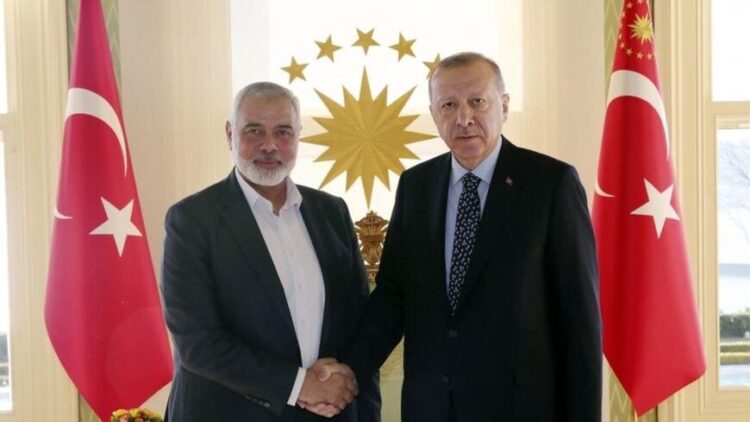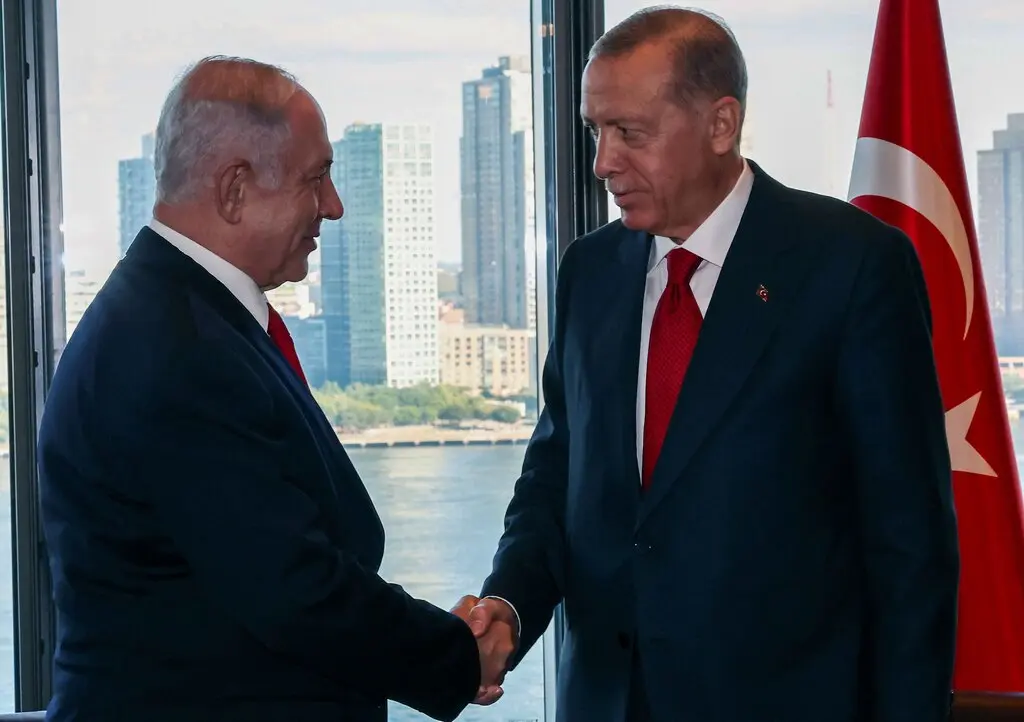Israel’s reconciliation process with Turkey has taken an enormous hit as the war in the Gaza Strip escalates.
In the last few days, Turkish President Recep Tayyip Erdogan has described Hamas as a “liberation organization,” accused Israel of being a “war criminal” state, and cancelled his forthcoming visit to Jerusalem.
In harshly condemning Israel for its vigorous military response to Hamas’ massacre of 1,400 Israelis and foreigners in southern Israel on October 7, Erdogan revealed his true colors as an ally of Hamas and an ardent champion of the Palestinian cause.
Erdogan unleashed his diatribes relatively soon after his Islamist government restored full diplomatic relations with Israel following a period of high tension.
Prior to his outburst, Erdogan acknowledged that “every country has a right to defend itself,” but he qualified that comment with the specious claim that “justice” was absent “in this case.”
The Israeli government, which in the past has accused Turkey of harboring Hamas operatives, reacted with undisguised fury.
Foreign Minister Eli Cohen recalled Israeli diplomats in Turkey. “In light of the escalating rhetoric, I have instructed the return of diplomatic representatives from Turkey to reassesses Israel-Turkey relations,” he said on October 29.
“A snake will remain a snake,” Israel’s ambassador to the United Nations, Gilad Erdan, said contemptuously as Israel pulled its diplomats out of Ankara and Istanbul on October 28.

Energy Minister Israel Katz, who is due to replace Cohen early next year, said that Erdogan had “exposed his true face.”
Abe Foxman, the former director of the Anti-Defamation League in the United States, dismissed Erdogan as a fair-weather friend. As he put it, “I have personally experienced the cynical up-and-down relations with Erdogan over the years. When he needed you, he was your best friend, but in a moment, he would turn on you … It seems he was never a real friend. He used his relationship cynically when it fit his personal political needs.”
Erdogan, who has yet to condemn Hamas’ slaughter of men, women and children more than three weeks ago, unleashed his bitter barrage at a pro-Palestinian rally in Istanbul two days ago. Accusing Western powers of enabling Israel’s “massacre” of Palestinians in Gaza, he asserted, “Israel, we will proclaim you as a war criminal to the world. We are making our preparations, and we will declare Israel to the world as a war criminal.”

During his speech, Erdogan cancelled his plan to visit Israel, citing its “inhumane” war.
Turkish Foreign Minister Hakan Fidan joined the fray when he likened Israel’s military campaign in Gaza to a “cime against humanity.”

In the days leading up to his latest blast, Erdogan said, “Hamas is not a terrorist organization, it is a group of mujahideen defending their lands.” The translation of his remarks in The New York Times was slightly different: “Hamas is not a terror organization. It is an organization of liberation.”
No one should be surprised by Erdogan’s pro-Hamas leanings.
Turkey’s bilateral relations with Israel have always hinged on the quality of Israel’s mercurial ties with the Palestinians. And over the years, Turkey has cultivated a close relationship with Hamas and has hosted its leaders. Five years ago, Erdogan described Hamas as “a resistance movement that defends the Palestinian homeland against an occupying power.”
Erdogan’s position on the Gaza war has gone from comparative restraint to full-throated partisanship.
Last week, he called for an immediate ceasefire. “It is clear that (Israel’s) security cannot be ensured by bombing hospitals, schools, mosques and churches,” he said. “I reiterate our call on the Israeli government not to expand the scope of its attacks against civilians and to immediately stop its operations that are bordering on genocide.”
In the face of Erdogan’s comments and anti-Israel protests in front of the Israeli consulate and embassy in Istanbul and Ankara, Israel advised Israelis in Turkey to leave “as soon as possible.”
Before calling for a truce, Erdogan announced that his government would observe three days of mourning in solidarity with the Palestinians over the explosion in a Gaza hospital parking lot that killed upwards of several hundred Palestinians. Ignoring a compelling Israeli statement that the incident was caused by a misfired Islamic Jihad rocket aimed at Israel, he blamed Israel for the mishap and labelled it as the “latest example of Israel’s attacks devoid of basic human values.”
Shortly after the outbreak of the war, Erdogan phoned Ismail Haniyeh, a Hamas leader, to inform him of Turkey’s effort to achieve a ceasefire and facilitate the entry of humanitarian aid into Gaza.
Erdogan’s shifting policy with respect to Israel is hardly surprising. His religiously conservative Justice and Development Party is deeply pro-Palestinian and profoundly anti-Israel. And Turkish public opinion is definitely on the side of the Palestinians.
As well, Erdogan’s colleagues and rivals have been egging him on to adopt a harder line toward Israel.
Erdogan’s far-right nationalist ally, Devlet Bahceli, urged him to intervene in the Gaza war if an immediate ceasefire is not reached. “It is our legacy from our ancestors to undertake the mission of protecting Gaza,” he wrote on X. “The Turkish Republic is ready to make Gaza a city of happy children and an Islamic town where our brothers will live in peace and security.”

Ahmet Davutoglu, the former Turkish foreign minister and prime minister who broke with Erdogan four years ago to form his own party, demonstrated his pro-Palestinian credentials by parading around Parliament draped in the Palestinian flag.
The director of the Middle East Institute’s Turkey program, Gonul Tol, believes that Erdogan’s anti-Israel rhetoric is rooted in his desire to solidify his legacy as an advocate of the Palestinian cause, as a leader of the Muslim world and as a protector of Sunni Muslims. “This is his moment,” said Tol.
Last July, in accordance with this policy, Erdogan hosted a meeting between Palestinian Authority President Mahmoud Abbas and Hamas political chieftain Ismail Haniyeh in an effort to reconcile these rivals.

At the same time, Erdogan attempted to patch up relations with Israel, which took a drastic turn for the worse after Israel’s first border war with Hamas in 2008-2009 and in the wake of the 2010 Mavi Marmara incident, during which Israeli commandos killed nine Turks on a Turkish vessel attempting to break Israel’s naval siege of Gaza.
Israel and Turkey — — the colonial power in Palestine for 400 years — reestablished a semblance of normal relations in 2016, but just two years later, Erdogan launched new tirades against Israel following an upsurge of violence, instigated by Hamas, along its border with Gaza.
Two years ago, against the backdrop of Turkey’s deteriorating relations with Egypt, Saudi Arabia and the United Arab Emirates, Erdogan pragmatically reevaluated his attitude toward Israel. He decided that Turkey’s vested interests would best be served if he put his feud with Israel behind him.
What brought Turkey and Israel even closer was their common approach to simmering tensions in the Caucasus, with both countries supporting Azerbaijan in its 2020 war against Armenia in Nagorno-Karabakh.
Even at the best of times, however, Erdogan refused to heed Israel’s request to order Hamas operatives in Turkey out of the country.
In March 2022, he broke the ice by inviting Israeli President Isaac Herzog on a visit to Ankara, in what was the first high-level meeting between Israeli and Turkish leaders in 14 years. Subsequently, Yair Lapid, the then Israeli prime minister, and Eli Cohen, Israel’s current foreign minister, visited Turkey to conduct talks with Erdogan.
Last month, in their first known meeting, Prime Minister Benjamin Netanyahu and Erdogan conferred in New York City to discuss their respective visits to Turkey and Israel and the prospect of mutual cooperation, particularly in the field of energy.
Turkey’s Energy Minister Alparslan Bayraktar said he would visit Israel in November to revive a project to carry Israeli natural gas to Turkey. One can assume that Bayraktar’s visit is no longer in the works.
Meanwhile, the war has caused an upsurge of antisemitism in Turkey, despite a conciliatory statement released on October 18 by the chief rabbi and the Jewish community. It read: “We strongly reject and condemn the targeting and killing of innocent civilians under any circumstances and wherever they are — especially in places like hospitals, schools and nursing homes. We support the efforts of (Turkey) since the first day to urgently restore peace and wish that all people can be brought together to a lasting peace as soon as possible.”
On the same day, the pro-government daily newspaper, Yeni Safak, carried a lurid front-page headline: This Terror State Must Be Destroyed.

A day earlier, the Islamist daily, Yeni Akit, questioned the loyalty and Turkish Jews and suggested that their citizenship should be revoked.
Karel Valansi, a columnist for the Turkish Jewish newspaper Salom, has said that Jews in Turkey are being increasingly conflated with Israelis. This is precisely what happened in the Arab world before and after the birth of Israel, resulting in the mass emigration of Jews from countries like Egypt, Iraq, Syria, Morocco and Libya.
Jews in Turkey do not find themselves in such precarious straits. But on the grassroots level, Israel is unpopular and is being demonized as the war in Gaza grows more deadly.
Eleven years ago, on a reporting trip to Turkey, I interviewed several Jewish community leaders in Istanbul. Among the topics I raised was Turkish attitudes toward Zionism.
When I asked that question, the room went suddenly silent.
Finally, a younger man volunteered an answer. “Zionism is a dirty word in Turkey,” he said.
His comment spoke volumes, and as the Gaza war rages, it still resonates.
